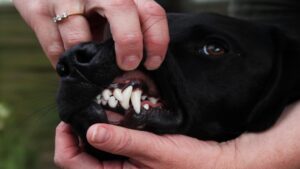Black labs are one of the most lovable dogs in the world. Known for this sleek black coat and intelligence, they make good family dogs. Some may notice black labs with white markings and in their brains, there are no longer recognized as purebred black labs. These labs with white markings on them are purebred and these white markings are not dangerous or harmful to health but are naturally cosmetic. So, let us understand the health impacts and what does white markings really mean?
Can purebred black Labrador have white spots?

Yeah, black labs can have white spots. These white spots are due to genetical problems, but they don’t mean that they are harmful. They are purely cosmetic. Even the ancestors like St John’s water dog have white spots on their body. These spots don’t affect the health, personality and trainability of a black Labrador.
Can black labs have white spots on their chest?
Yes, black labs have most commonly white markings on their chest. They are purely cosmetic and have no effect on their trades such as training, health and temperament.
Can black labs have white spots on tail?
Yes, black labs can have white spots on tail. These marks make them more attractive, and they don’t mean that lab is not purebred. These are due to genetics.
Common body parts having white spots
All parts of a labs body can’t have white spots. In fact, there are some regions or parts that have wide spots. These include:

- Chest
- Tail
- Toes or paws
- Chin
- Face
- Around eyes (rarely)
Weight and Height of Black labs with white markings by age and gender

| Age | Male Weight | Male Height | Female Weight | Female Height |
| 8 weeks | 4.5 – 6.8 kg (10 – 15 lbs) | ~10–12 inches (25–30 cm) | 4 – 6.3 kg (9 – 14 lbs) | ~9–11 inches (23–28 cm) |
| 3 months | 10 – 14 kg (22 – 30 lbs) | ~12–15 inches (30–38 cm) | 8.5 – 12.5 kg (19 – 27 lbs) | ~11–14 inches (28–36 cm) |
| 6 months | 21 – 26 kg (46 – 57 lbs) | ~18–20 inches (46–51 cm) | 18 – 23 kg (40 – 50 lbs) | ~17–19 inches (43–48 cm) |
| 9 months | 27 – 31 kg (59 – 68 lbs) | ~21–23 inches (53–58 cm) | 22 – 27 kg (48 – 60 lbs) | ~20–22 inches (50–56 cm) |
| 12 months | 29 – 34 kg (64 – 75 lbs) | 22–24 inches (56–61 cm) | 25 – 31 kg (55 – 68 lbs) | 21–23 inches (53–58 cm) |
| Adult (1.5+ yrs) | 30 – 36 kg (66 – 80 lbs) | 22.5–24.5 inches (57–62 cm) | 25 – 32 kg (55 – 70 lbs) | 21.5–23.5 inches (55–60 cm) |
Training of Black labs with white markings
The training of a Black lab with white markings is as same as that of a normal lab. Here is one simple trick that I want to share with you to train: Train them at young age and spend your most of the time with them. It creates a strong bridge between you and your Labrador. Some dog parents may get their Labrador a new dog thinking that the loneliness of their Labrador might get away, but this is not enough. Your love and care is all that they want.
Temperament of Black labs with white markings
Labradors’ temperament is not always perfect. Sometimes it can be little destructive, aggressive, tend to bark a lot, and gets over excited while playing. But the natural behavior of this sporting dog is loving, caring, loyal, and protective towards their owners. In the terms of temperament, training place a very crucial role. Labradors are easy-going dogs which makes them great for the first-time owners.
Health and Lifespan of Black labs with white markings
The health of a Black lab is not affected by the white markings. He remains healthy but some problems may arise during seniority age which are generally common in labs such as hip dysplasia, elbow dysplasia, diabetes, heart- related problems and more. Life span of a healthy Labrador on average is 10 – 12 years.
Conclusion
While it is not common for a black Labrador to have white spots but sometimes it may be seen on any of their body parts. These white spots don’t mean they are not purebred, and they don’t affect they are weight, height, temperament, health, and training.
If you have another enquiry the comment box is down. Stay tuned for more such articles. Bye and have a nice day!




